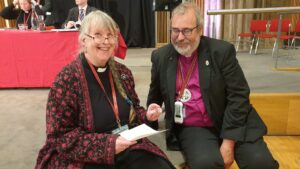On Day Two of General Synod 2024, the issue of nuclear weapons dominated the morning agenda as part of the Mission Board session.
At a previous Synod, it had become clear that were was a diverse range of approaches and understandings around policies, weapons systems and complexities around the industrial-economic base factors.
To take account of these differences, the Church in Society committee brought a motion which sought to find an overall agreed position that the use of nuclear weapons in warfare can never be theologically or ethically justified. It stated:
‘That this Synod agree the position that the use of nuclear weapons can never be theologically justified, and the church commits to a policy of advocating for arms control, disarmament and non-proliferation of nuclear weapons.’
Introducing the motion, the Rev Roxanne Campbell, a member of the Church in Society Committee from the Diocese of Brechin, said: “We live in a global context where the potential for nuclear conflict looms, posing a terrifying existential threat to the whole of creation.
“By articulating a firm position against the use of nuclear weapons, the Church not only upholds its moral responsibility to safeguard human life and the whole of God’s creation, but also contributes to broader dialogue on peace, security, and the common good.
“A colleague has made the very valid observation that those who are prepared to deploy such weapons would probably care very little for what a church has to say on the matter. So why seek to say anything at all? We speak because our faith compels us to hope for a world where trust, safety and peace matter; where all are able to flourish; where creation is able to thrive free from the threat of annihilation.
“Nuclear weapons, with their terrifying potential for utter destruction, are an affront to God and to the whole of creation.”
Ms Campbell, pictured above, acknowledged that the question of deterrence is complex, and this was borne out by a range of comments from the floor.
Robert MacDonald, Diocese of Argyll & The Isles, told Synod of his experience of spending a day on board the nuclear submarine HMS Vengeance, and a deeply troubling encounter with the weapon launch process where he found himself asking: ‘Where does this place fit with my Christian views?’
“But tyrants don’t believe in peace from reconciliation,” said Mr MacDonald. “History shows us that the army with the strongest weaponry will prevail. The presence of an effective deterrent will stop this from happening.”
Morag O’Neill, Diocese of Glasgow & Galloway, also gave a personal perspective, explaining that her home in Dumbarton is ten minutes away from the nuclear submarines. “I have lived all my life knowing that if there was even an accident, I would be gone. I grew up with this unconscious, subliminal fear, and I am very much in favour of the motion.”
The Rev Canon Mary Jepp, Diocese of Brechin, recalled her childhood in Canada during the Cuban Missile Crisis, and reminded members to think of those who cannot defend themselves – the weakest – when making their decision.
Jenny Whelan, Diocese of Glasgow & Galloway, looked back to the same crisis when she described the memory of her father kissing his seven children goodnight and saying: ‘We won’t be here tomorrow.’ Ms Whelan said: “We don’t want to live under this threat. We need to get rid of these weapons.”
In another powerful childhood memory, Acting Bishop Dorsey McConnell, Diocese of Aberdeen & Orkney, told the story of being raised in the Strategic Air Command, as the son of a general in the United States Air Force. The family home contained a bomb shelter where they were to shield from any blast and come through the aftermath of any nuclear attack. From time to time, the provisions had to be checked and if necessary, replaced. The young Dorsey found, among the items, a set of toy cars, and was thrilled. His mother realised what had happened, and told him that these had to be put back, because they were only there in the event of war.
“I went to bed that night and prayed for war,” said Bishop Dorsey.
The Bishop said he supported the motion but believed the issue goes beyond the simple question of for/against nuclear weapons. He said that the fundamental issues of greed and ambition lay behind the desire to build a nuclear weapon armoury, treating the world as a plaything, and it was the Church’s call to challenge those issues.
The Very Rev Kenneth Gibson, Diocese of Brechin, said that he was the colleague who had asked Ms Campbell if those ready to deploy weapons would be at all concerned about what a church says, but he wanted to make it clear that he supported the motion, and in fact thought it did not go far enough. “It is important that as a church we make that statement to the world,” said Dean Gibson.
The Rev Bonnie Hills-Evans (pictured above with Bishop Mark Strange, Primus), from the Diocese of St Andrews, Dunkeld & Dunblane, pointed out that while we might perceive a threat to our lives, there are others elsewhere in the world who feel that we are trying to destroy their ways of life, and reminded Synod that “we are called as Christians to love our enemy”, while the Rev Canon David Paton-Williams, Diocese of Edinburgh, asked why we consider ourselves to be a subject of possible attack, pointing out that not every country feels the need to hold nuclear weapons.
The Very Rev John Conway, Diocese of Edinburgh, acknowledged that ‘disarmament’ is the contentious word in the motion but pointed out that it is not preceded by ‘unilateral’. “Vote for the motion,” said Provost Conway, “and then we can talk about how we achieve disarmament.”
As the debate drew to a close, Bishop Ian Paton, Diocese of St Andrews, Dunkeld & Dunblane, said that he too had spent time on a nuclear submarine, HMS Revenge, when he was younger.
“The crew who would have had to launch the weapons knew that if they did, they would have no-one to go home to, no home to go to,” said Bishop Ian. “They would have voted for this motion.”
Synod members passed the motion overwhelmingly, with 85 for, 15 against and 10 abstaining.
Before the Mission Board session closed, the Rev Denise Herbert, Diocese of Brechin, raised the issued of assisted dying, and asked if the Church in Society committee would consider discussing this issue again, three years after the committee made a public submission during the Member’s Bill stage of the proposed legislation which will be debated this year in the Scottish Parliament.
“I wonder how much discussion there has been in dioceses?” asked Ms Herbert. “Could Church in Society discuss this and feed into dioceses? We need to hear voices, for and against.”
In response, Church in Society convener, the Rev Simon Scott, confirmed that assisted dying is on the committee’s agenda, but doubted whether it would be possible to discuss the matter with dioceses before the Scottish Parliament’s call for views deadline of 16 August 2024. Mr Scott also suggested that big issues such as this should perhaps become part of diocesan synod agendas in future, but pointed out that it was possible for individuals to respond to the call for views, just as Church in Society is doing, although neither would be considered to represent the view of the Church.
Earlier, the day’s business at St Paul’s & St George’s Episcopal Church in Edinburgh had opened with two presentations on local and global mission. The Rev Dr Hamilton Inbadas delivered a presentation on the future purpose of the Global Partnerships Committee. Dr Inbadas, convener of the committee, offered a history lesson on the Scottish Episcopal Church’s global mission from 1871, explaining that it began with setting up fixed missions, progressed to sending chaplains to a variety of locations around the world, and latterly developing into a funding body which invites applications for financial support.
Dr Inbadas asked is this was still appropriate, and whether enough was being done. Synod then broke into discussion groups to consider questions relating to local and global mission: What would be absent from your local area if your worshipping community was not there? What two new things could your church do in and with the local community and what resources would you need to make it happen? And what should the Church’s global mission look like in the 21st century?
Towards the end of the morning session, a series of motions regarding Canons 15 and 16 brought by the Inter-Church Relations Committee were carried by Synod, followed by affirmation of the continued participation of representatives of the Scottish Episcopal Church within the Scottish Christian Forum, before members were then invited to attend one of a series of ‘Meet The Convener’ sessions ahead of lunch.
–

